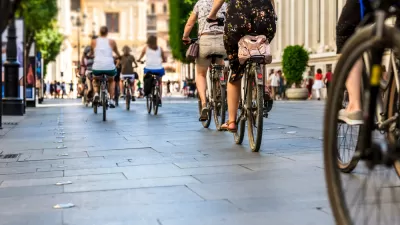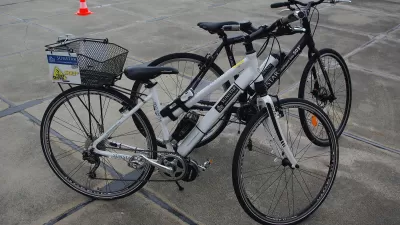The flexible credit is meant to support a variety of bike-related expenses, including bike share memberships.

Eric Sakalowski assesses the federal bike commuter credit proposed as part of the bicycle benefits in the Build Back Better Act, which is intended "to cover a broad range of expenses that a person might incur as they commute to work by bike." The program doesn't require a new bike purchase and covers things like bike share memberships. "[E]mployers can offer employees up to $81 a month in benefits that are not subject to income tax," a much higher benefit than the $20 provided in an earlier version of the credit.
"Even more importantly, a coordination provision allows the same person to claim the bike commuter benefit and the transit and parking benefits under existing law," which allows "more occasional bike commuters to claim the benefit thereby fostering more commutes by bike for those who do more mixed forms of transportation." Unfortunately, the credit does not apply to independent contractors or people not in the labor force, "and these groups tend to be disproportionately disadvantaged." Meanwhile, the seemingly generous $81 monthly benefit is substantially less than the $270 offered by the transit and parking benefits.
Along with the e-bike credit, says Sakalowsky, the bike commuter credit "will not change the situation overnight, especially as we continue to lavish far richer tax credits on cars. But, they offer a foundation at the federal level on which we can continue to build."
FULL STORY: Op-Ed: What is the Federal Bike Commuter Benefit?

Alabama: Trump Terminates Settlements for Black Communities Harmed By Raw Sewage
Trump deemed the landmark civil rights agreement “illegal DEI and environmental justice policy.”

Planetizen Federal Action Tracker
A weekly monitor of how Trump’s orders and actions are impacting planners and planning in America.

The 120 Year Old Tiny Home Villages That Sheltered San Francisco’s Earthquake Refugees
More than a century ago, San Francisco mobilized to house thousands of residents displaced by the 1906 earthquake. Could their strategy offer a model for the present?

In Both Crashes and Crime, Public Transportation is Far Safer than Driving
Contrary to popular assumptions, public transportation has far lower crash and crime rates than automobile travel. For safer communities, improve and encourage transit travel.

Report: Zoning Reforms Should Complement Nashville’s Ambitious Transit Plan
Without reform, restrictive zoning codes will limit the impact of the city’s planned transit expansion and could exclude some of the residents who depend on transit the most.

Judge Orders Release of Frozen IRA, IIJA Funding
The decision is a victory for environmental groups who charged that freezing funds for critical infrastructure and disaster response programs caused “real and irreparable harm” to communities.
Urban Design for Planners 1: Software Tools
This six-course series explores essential urban design concepts using open source software and equips planners with the tools they need to participate fully in the urban design process.
Planning for Universal Design
Learn the tools for implementing Universal Design in planning regulations.
Clanton & Associates, Inc.
Jessamine County Fiscal Court
Institute for Housing and Urban Development Studies (IHS)
City of Grandview
Harvard GSD Executive Education
Toledo-Lucas County Plan Commissions
Salt Lake City
NYU Wagner Graduate School of Public Service





























